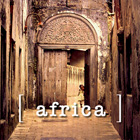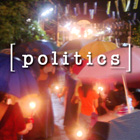
|
|||||||||||||||
Photo credit for "Africa" graphic, above: © 2005 Jennifer Lewis
|
4 MILLION KILLED IN DEMOCRATIC REPUBLIC OF CONGO SINCE 1998
LARGELY OUT OF SIGHT OF WORLD MEDIA, MILLIONS HAVE BEEN KILLED IN ONGOING CONFLICT, OR BY RAMPANT DISEASE, POVERTY 12 February 2006 Ongoing armed conflict in the Democratic Republic of Congo —formerly Zaire— has taken an estimated 4 million lives since 1998. While the brutal civil war that began in 1998 took an estimated 2 million lives, continued factional conflict, disease, lack of basic civil social services and malnutrition, due in part to crop failure, have combined to take another 2 million lives. Reports vary between clearly stating that 3.9 million people died during the 1998-2003 civil war and others which parse the numbers, assigning over 2 million to the conflict and nearly 2 million more to post-conflict chaos, disease and starvation. 9 nations and as many as 20 armed groups fought in the war, and allegations of mass killings of civilians were directed at several different sides. More than 350,000 people are thought to have died in 2004, after the ceasefire, as credible estimates suggest an average of around 1,000 people per day killed by violence, disease and food scarcity. The so-called Second Congo War has been called the African World War and is the deadliest conflict the world has seen since World War II. The crisis is one of the most overlooked in the world, even though it rivals the most severe and devastating humanitarian disasters of the 20th century. The situation appears to be again worsening in recent weeks, and calls have been made for more aggressive action to curb violence, detain war criminals and implement effective aid programs that could help the country return to a state of sustainable civil order. The Reuters Foundation service AlertNet has reported Human Rights Watch's call for the arrest of Laurent Nkunda, a rogue Congolese military officer whose rebel army is engaged in renewed hostilities in eastern DRC, and who has, himself, been charged with war crimes. HRW says Nkunda's whereabouts are well-known to DRC authorities and to UN peacekeeping forces, despite the fact that the arrest warrant, issued in September 2005 has not yet been executed. A complex array of competing factions with sometimes intersecting interests are at the heart of the ongoing violence. Hutu-aligned forces, with ties to Hutus possibly responsible for the 1994 Rwandan genocide, with the goal of ethnic cleansing of the eastern DRC Banyamulenge people, while Tutsi-aligned forces include national armies from Rwanda and Burundi, nations with Tutsi-controlled governments and Banyamulenge rebel groups, including ethnic Tutsis. But the conflict is not limited to these two ethnically-aligned factions. There are also nationalist and commercial interests involved, aligned more or less with Ugandan or Kinshasa-based elements. Kinshasa-aligned groups included the Congolese army, along with allied nations seeking a strong DRC state in control of its natural resources and able to enforce peace in the region. Ugandan-aligned groups are reported to have sought the weakening of the DRC and access to its natural resources, for the expansion of wealth in upper levels of Ugandan business and government. The forces included the Ugandan army and rebel groups backed by Ugandan money and weapons. While Tutsi-Hutu ethnic violence and mutual fear of genocide have driven much of the conflict, the two groups also formed strategic alliances with the other factions in order to defend or pursue common interests. Hutu forces have tended to align themselves with Kinshasa, seeking a stronger Congolese government and protection against foreign Tutsi forces and foreign takeover from the east, while Tutsi factions have tended to side with Ugandan and Rwandan elements seeking to weaken the power of the Kinshasa government and destabilize the eastern portions of the DRC. The eastern part of the DRC, bordering on the African Great Lakes states of Uganda, Burundi, Rwanda, is part of one of the more densely populated regions of the world, with an estimated 107 million people living in a relatively small geographical area, meaning that demographic and economic pressures have stoked ethnic rivalries and contributed to the sporading intensifying of latent conflict among key communities. After a short-lived ceasefire was agreed in 1999 by the six nations involved in the war, hostilities resumed. DRC president Laurent Kabila was assassinated by one of his bodyguards in January 2001; the event raised questions about whether political allies of Kabila were responsible and whether the killing had been intended to undermine the DRC government or open the possibility for long-term stability. President Kabila was replaced by his son Joseph Kabila, looked upon favorably by western observers and thought to be more likely to moderate hostilities and reach a solution. His rise was backed by Robert Mugabe of Zimbabwe, whose regime has taken on increasingly authoritarian tendencies in recent years, causing added tensions in the region. But there has never been a sustained resolution to the war. In January 2006, the BBC cited the Lancet as reporting an estimated 36,000 people are being killed every month by a combination of armed conflict, criminal violence, disease and malnutrition. [s]
CONGOLESE CHILD SOLDIERS DISARMED The UN reports that over 400 child soldiers were "demobilized" in the Eastern Congo, a region still plagued by instability and deprivation. The child rebels were offered humanitarian and food aid in exchange for their weapons, setting what might be an example for other such missions in war-torn, remote regions. [Full Story] |
||||||||||||||
|
|||||||||||||||

